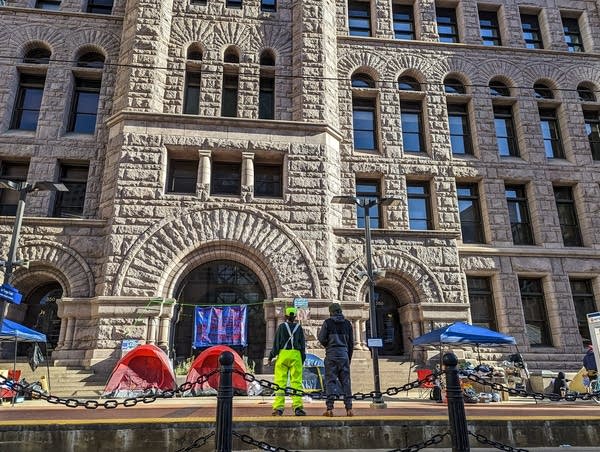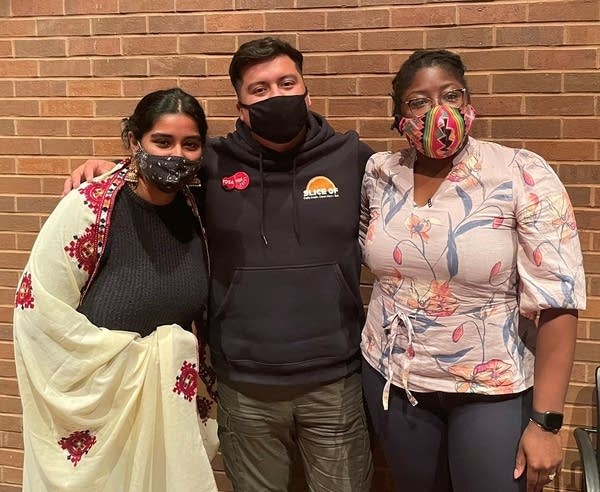Minneapolis City Council too gridlocked to change homeless encampment approach

Go Deeper.
Create an account or log in to save stories.
Like this?
Thanks for liking this story! We have added it to a list of your favorite stories.
This is part three of a five-part series from MPR News examining how the city of Minneapolis approached homeless encampments in 2022.
Read more: Part one | Part two | Part four | Part five
The string of evictions in September and October ignited another wave of community outrage about how Minneapolis treats people experiencing unsheltered homelessness.
Dozens of homeless residents and allies showed up to a City Council committee meeting in early October, exasperated and demanding an end to encampment evictions. Several people who were kicked out of camps relocated their tents to the sidewalk outside City Hall in protest.
Turn Up Your Support
MPR News helps you turn down the noise and build shared understanding. Turn up your support for this public resource and keep trusted journalism accessible to all.
Ten days later, the council voted down a proposal from Minneapolis City Council Member Aisha Chughtai to pause encampment closures.
“I care about the issue of unsheltered homelessness because I am somebody who has been impacted by it, throughout my life,” she said. “I was unsheltered. I'm the oldest of four. We were all under three years old and living in a storage container.”
Chughtai began her time on City Council in January 2022 with an eagerness to work on issues important to her constituents, including homelessness and policy related to encampments, and thought she had Frey’s blessing.

“The first conversation I ever had with him on homelessness was him saying to me … ‘We don't have a current policy on how we respond to homelessness. It's the council's prerogative to create that. If you wanted to go and do that work, I'd welcome you going and doing that work.’”
Homelessness, and especially shelters, are mainly in the county’s purview. The city of Minneapolis has a fairly narrow scope of what it can do on the issue, mainly regarding public health and land use.
When shutting down encampments, the city often points to the section of its code that prohibits temporary shelter. Chughtai knew it wasn’t within her control to ban the practice of evictions altogether, so over the summer she and council member Jason Chavez sought to change the temporary shelter ordinance.
“We had a series of really, really frustrating and unproductive meetings with members of the administration, with the mayor’s office, on this issue,” Chughtai said.
Then came the fall evictions, one after another. Chavez and Chughtai weren’t getting anywhere working with the mayor and the city, so they went a different route and brought proposals to the City Council directly.
But there, political gridlock stands in the way of progress on the issue.
Chughtai’s first motion was to pause evicting encampments. Council members went back and forth about whether this decision was within their authority, and ultimately, city attorneys said that it wasn’t.
Thanks to the new “strong mayor” structure that went into effect in 2022, as approved by voters, the council doesn’t have the power to direct city staff to do, or stop doing, anything. The attorneys said it’s the council’s job to make policy and that suspending evictions crosses the line into something only the mayor — the city’s new executive — has power over.
The council took a vote on pausing evictions anyway, and it failed to pass.
“We see this administration use government structure as a trump card, and it is not one,” Chughtai said during the council meeting.
Council Member LaTrisha Vetaw called Chughtai’s proposal “performative” and an attempt to play to “a group of people who come to threaten you and make you feel bad” — referring to the homeless residents and their advocates at recent council meetings.
A simpler idea also died in the council. Council Member Elliott Payne proposed a resolution to require that ahead of evictions, the city confirms each resident will have access to a shelter bed and storage for their belongings, and give residents and city staff a minimum of seven days’ notice.
The Minneapolis City Council is made up of 13 members. Long a liberal city, one might think that agreement would be easier in Minneapolis than in other cities. Its current council is 12 DFLers and one with a socialist party, but the division is strong. For example, on the issue of public safety, council abolitionists regularly clash with pro-police council members.
Five council members — three of whom are socialists — often vote together and are most likely to disagree with Mayor Frey (Payne, Robin Wonsley, Jeremiah Ellison, Chavez and Chughtai).
Another group of five are often aligned with the mayor and tend to vote together (Michael Rainville, Vetaw, Lisa Goodman, Emily Koski and Linea Palmisano). Chughtai, herself a socialist, refers to them as conservatives.
The final three council members have voted in both directions (Jamal Osman, Andrea Jenkins and Andrew Johnson).
For something to pass in the Minneapolis City Council, it needs nine votes or seven votes plus the mayor’s signature. With the council’s current makeup, it’s unlikely anything controversial will ever pass without the mayor’s approval.
“The reality of it has been that almost every split vote we’ve ever had — all three ‘middle votes,’ have voted with the right. And so we’ve had eight-five votes on almost every split issue that we’ve ever had,” Chughtai said.
Chughtai and her allies did secure a small victory: City staff will analyze the financial, health and safety costs associated with encampment closures and make new recommendations with minimal police involvement.
“We pay so much money in MPD cost alone for an encampment eviction,” Chughtai said. “If we just massively reduced or removed that cost altogether, we would save literal millions of dollars.”
But even that win came with political confusion: Frey first rejected it on the grounds that it also didn’t comply with the new city government structure, because it ordered city staff to do something. Even council requests for information from staff must go through the mayor first.
For Frey to approve the measure, Chughtai had to first rewrite it as a request to the mayor, asking that he direct his staff to conduct the analysis.
Minneapolis City Council President Andrea Jenkins, who is the leader of the council and often sits in its political center, declined to comment on how political division kept the council from making meaningful progress on homelessness in 2022.
“And I think this very diverse council — diverse in its ethnicities and its ages and its geographical representation — I think we all have varying opinions about topics as they arise,” she said.

When asked about the city’s practice of shuttering encampments — several of which have been within her ward in south Minneapolis — she echoed the mayor and his allies at the city.
In 2022 she voted against putting a pause on clearing encampments and against updating policy around responding to encampments.
“I don’t want people in these really frigid conditions and the sometimes criminal behavior that happens in these encampments,” she said. “I want people to take advantage of the opportunities that could help them get on the track to safe and permanent housing.”
Council Member Jeremiah Ellison said he and others on the council who have asked questions about the city’s encampment eviction process have been shut out of the discussion entirely.
The Near North encampment in Ellison's ward was one of the most publicized in the city since people fought police to defend it in 2021, yet the city closed it while Ellison was out of town. He said he wasn't even notified it would happen.
“Those are the kinds of things that make me question whether this institution is interested in innovative ideas, is interested in working with council members who have questions,” he said.
In contrast, St. Paul has clear, written policy on how to close encampments, according to the Star Tribune.
While disappointed with the lack of movement on the issue, Chughtai said she’s committed to trying to work with the mayor, even on areas where they disagree.
“None of us have the power to say, ‘We’re not going to do this anymore.’ But we have the power to make them feel pressure to justify their choices and feel pressure to make a different set of choices. And we’re doing that pretty effectively,” she said.





